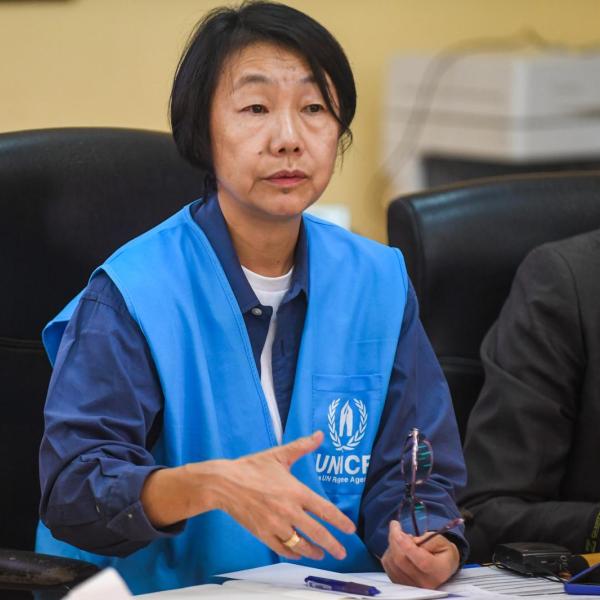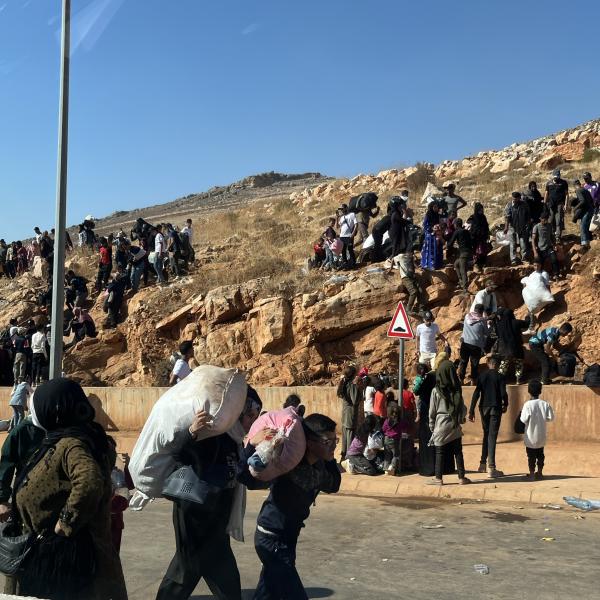A conflict breaks out and suddenly people have to leave their homes head over heels. We are experiencing this again with the airstrikes in Lebanon. More than 200.000 people are looking for a safe place to stay within Lebanon, 100.000 already crossed the borders with Syria - and the numbers keep on rising. These displaced people need help immediately, and you can also support them. Thanks to your donation, UNHCR can provide these people with the help they need most urgently: Shelter, mattresses, blankets and other items for the most in need. UNHCR plays a crucial role in responding quickly and efficiently to not only the refugee emergency in Lebanon but worldwide. The UN Refugee Agency is responsible for coordinating emergency preparedness, ensuring the safety of our personnel and operations, and managing the supply chain that delivers essential goods to displaced communities. From providing life-saving supplies during crises to safeguarding personnel and displaced individuals in high-risk environments, UNHCR efficiently meets the urgent needs of refugees and internally displaced persons with precision and speed.
We spoke with Shoko Shimozawa, UNHCR’s Emergency Director, about her extensive field experiences and her leadership of the Division of Emergency, Security and Supply.

Shoko, could you share a bit about your career at UNHCR?
I joined UNHCR in 1991. My first posting was in Mexico, where I worked with Guatemalan refugees and Haitian asylum seekers. I’ve since worked in various countries including Russia, Afghanistan, and Iraq, and have held roles at UNHCR headquarters in Geneva. I’ve been involved in emergency responses throughout my career and was also deployed to an emergency as part of the Emergency Roster Team (ERT). I became the Director of Emergency, Security, and Supply (DESS) in 2020.
What does your role as Director of DESS involve?
My division is responsible for overseeing emergency preparedness and responses, security of personnel, and supply chain management. We work with field offices for the safety of our personnel, partners, and displaced people. We manage the supply chain, and coordinate different aspects of emergency response including the emergency roster, training of personnel to be ready for deployment during emergencies. Our work is operational and closely linked across different areas of UNHCR work, especially during emergencies.
How does UNHCR respond when an emergency occurs?
UNHCR has a robust emergency response system, which is one of the key priorities of the Organization. When a new emergency arises, we deploy personnel, resources, and funds in principle within 72 hours. We have a stockpile of relief items for ca. 1 million people, stored in seven locations worldwide, allowing us to respond quickly. The emergency roster plays a key role, with members committed to being themselves available for deployment within 72 hours. This system ensures that we can address urgent needs as soon as they arise.
Can you recall a memorable field experience?
One story that stands out is from my time in Iraq when IS occupied parts of the country. I met a young man and his elderly mother who had previously fled Iraq for Syria as refugees, only to be displaced again back to Iraq due to conflict in Syria. They moved multiple times, and despite the hardships, the mother expressed immense gratitude for the little help they were receiving. She was ready to start again, and wanted to extend help to others despite all the difficulties they themselves were facing. Her resilience and strength, and her immense generosity to others even in most trying time deeply moved and humbled me. We learn a lot from them!
Protection and solution - this dual mandate is key to our daily work. And refugees can be the great contributors to the society they live.

How do you measure success in your operations?
Success means bringing people to safety and provide them with the protection that they require. Our priority is to ensure they are out of danger, address their immediate needs, such as shelter, food, health and provide any initial support that could lead to longer-term solutions. We pay particular attention to the protection and well-being of vulnerable groups, as many of the displaced are often women and children. We must also ensure the safety of our personnel, so they can continue working in high-risk locations. In all situations, our approach is to work with partners so our collective response can be maximized. We work a lot with local national first responders including community leaders.
What makes UNHCR unique in handling emergencies?
UNHCR’s unique mandate which is embedded in the 1951 Refugee Convention and its 1967 Protocol is to protect forcibly displaced and stateless people and seek long-term solutions for them. It comes out often more acutely in emergencies. Not only we provide material safety, but we also work with different stakeholders to ensure their physical and legal safeties. Those crossing international borders seeking asylum should not be returned to danger, and must be helped, until such time they find a more permanent solution. Protection and solution - this dual mandate is key to our daily work. And refugees can be the great contributors to the society they live. There are so many wonderful stories and examples to attest to that. It is, therefore, important that even in acute emergencies, we need to have that vision and mission in mind, and try to reflect them into our responses.
Do you have a message for UNHCR supporters in Switzerland?
We are deeply grateful for the support from individuals and the private sector. Their donations are not just financial contributions, but also a clear demonstration of people’s empathy and solidarity. We must take emergencies seriously and respond to the best of our abilities. This support means a lot to us and encourages us to keep working for displaced people worldwide.
Thank you, Shoko, for sharing your experiences and for your tireless efforts in leading such impactful work.
In conclusion, Shoko Shimozawa’s leadership exemplifies the commitment and resilience required to manage UNHCR's complex emergency response efforts. Her deep-rooted experience and dedication to protecting displaced populations and ensuring the safety of UNHCR personnel is inspiring. The insights shared highlight the crucial role UNHCR plays in responding swiftly and effectively to humanitarian emergencies around the world.
And we thank you, dear supporters, for your donations. They enable UNHCR to respond to emergencies like the one in Lebanon and bring displaced people to safety.